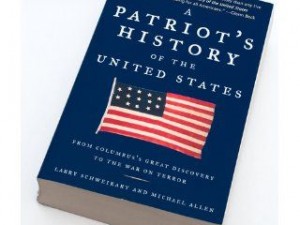A Patriot’s History of the United States

For the first time, young people and minorities had in a historian an actual hero, and all Zinn had to do was publish the things that people who never had a voice actually said. Reading Zinn has since become all the rage.
Instructions
-
1
Last month, Zinn spoke to a captive audience on The Daily Show. A controversial episode of The Sopranos, in 2002, had Tony railing to his son, A.J., simply for reading Zinn's book. And in 2003, a public reading of the book was held to commemorate its millionth copy sold, with the "people's" passages read by Alice Walker, Alfre Woodard, Kurt Vonnegut, Danny Glover, and James Earl Jones.
True to the climate of our times, even this seminal work has been rebutted by a faction of Christian conservatives in the recent release, A Patriot's History of the United States: a re-retelling of our history from the perspective of, well, white guys. Disgusted by the fact that our current textbooks "give more time to Harriet Tubman than Abraham Lincoln," authors Larry Schweikart and Michael Allen have produced a kinder, gentler account of icons such as Christopher Columbus, George Washington, and even Richard Nixon.
The most infuriating (for the level-headed) sections of the book come from the book jacket and the introduction. This is where the typically pissed-off, fire-and-brimstone sermon Republicans love delivering is at its peak. Making declarations like "we think that an honest evaluation of the history of the United States must begin and end with the recognition that America's past is a bright and shining light," and that our forefathers, though slave owners themselves, didn't really like doing it and built a system that would let them all go eventually anyway, one might be tempted to throw this book against a wall. Please do that. But afterward, consider a few things.
When not bumbling through stats to show that Columbus didn't actually kill all the Indians (they maintain it was closer to half), the rest is essentially straightforward. It lacks Zinn's compelling excerpts from slave diaries and battlefield accounts of the Vietnam War, but the body of Patriot's reads like a U.S. History For Dummies Who Think Blood Is Gross.
Harmless and fact-oriented, the book reveals more about the way conservatives approach their demographic, and thereby win elections. The easy-to-read parts, like the timetables and chapter intros are the ones most likely to be read first. They squeeze as much vitriol toward liberals as they can in these spaces, before getting to the text, which can be, at times, somewhat fair and, dare I say it, balanced.
The book's undoing is when it veers into personal territory. The authors clearly have so much hatred toward Democrats, it detracts from their story and the effectiveness of the telling spirals downward, starting somewhere around Kennedy and reaching its lowest point at the Clinton White House. A shame. They get on quite the roll for a time, especially the concise telling of the Dred Scott case, but honestly, what is the excuse for the following Kennedy timeline:
1960: Kennedy elected. 1961: Bay of Pigs. 1962: Cuban Missile Crisis. 1963: Kennedy assassinated.
For a laugh riot, check out the section devoted to women's suffrage. In a single paragraph, the authors take a bafflingly sharp left, going from pesky "facts" about the various organizations that sprung up in the 20's devoted to winning the right to vote for women, to an exhaustive biography of Margaret Sanger, a feminist who they paint as a complete nutcase, and make a round-the-way argument that her fight for the right to vote was really about abortion and birth control and that the seeds of her evil quest resulted in what we know today as "Planned Parenthood" (that bad place that gives out condoms for free).
The distasteful often becomes the inexcusable, such as when they use FBI director J. Edgar Hoover's description of Martin Luther King as "the most dangerous Negro in this nation," to state that King's opponents, such as Malcolm X, were the actual "dangerous Negroes."
You'll want to pay attention here, African American community. This is where your history gets rewritten.
One more thing: why doesn't a book, who's entire gimmick is a rebuttal against Zinn's masterwork, not use a single quote or annotation from the original text? In 825 pages, People's History is mentioned only in the introduction. Of course, that's probably all a real Patriot has time to read anyway. O'Reilly Factor is on soon.




